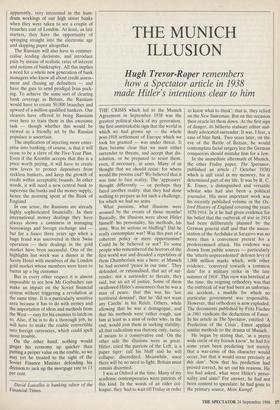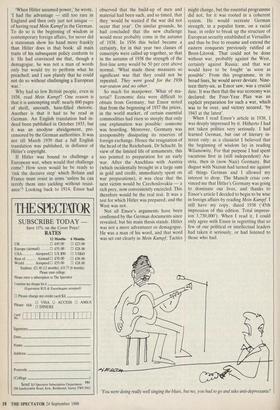THE MUNICH ILLUSION
Hugh Trevor-Roper remembers how a Spectator article in 1938 made Hitler's intentions clear to him THE CRISIS which led to the Munich Agreement in September 1938 was the greatest political shock of my generation, the first unmistakable sign that the world in which we had grown up — the whole post-1918 settlement of Europe which we took for granted — was under threat. It then became clear that we must either surrender to threats, and accept that dis- solution, or be prepared to resist them, even, if necessary, in arms. Many of us thought that we should resist: for where would the process end? We believed that it was time to face reality. The 'appeasers' thought differently — or perhaps they faced another reality: that they had done nothing to prepare us for such a challenge, for which we had no arms.
What passions, what illusions were aroused by the events of those months! Basically, the illusions were about Hitler himself: his personality, his methods, his aims. Was he serious or bluffing? Did he really contemplate war? Was this part of a coherent policy or mere opportunism? Could he be believed or not? To some people who remembered the horrors of the first world war and dreaded a repetition of them Chamberlain was a hero: at Munich he had secured 'peace in our time'. They defended, or rationalised, that act of sur- render: not a surrender to threats, they said, but an act of justice. Some of them swallowed Hitler's assurances that he was a man of peace, that this was his 'last territorial demand', that he 'did not want any Czechs' in his Reich. Others, while allowing that he was a demagogue, and that his methods were rather rough, saw him at least as a man of order who, in the end, would join them in seeking stability: all that radicalism was rhetoric only, tactic- al means to a conservative end. On the other side the illusions were as great. Hitler, cried the patriots of the Left, is a paper tiger: call his bluff and he will collapse, discredited. Meanwhile, since there will be no need to fight, Britain must remain disarmed.
I was at Oxford at the time. Many of my academic contemporaries were patriots of this kind. In the words of an elder col- league, they 'had to wait till Friday in order to know what to think': that is, they relied on the New Statesman. But on this occasion their oracle let them down. At the first sign of danger, its hitherto stalwart editor sud- denly advocated surrender. It was, I fear, a case of blue funk. Two years later, on the eve of the Battle of Britain, he would contemplate facial surgery lest the German conquerors should mistake him for a Jew.
In the immediate aftermath of Munich, the other Friday paper, The Spectator, published an article (7 October 1938) which is still vivid in my memory, for it determined part of my life. It was by R. C. K. Ensor, a distinguished and versatile scholar who had also been a political journalist. His most important work was his recently published volume in the Ox- ford History of England covering the years 1870-1914. In it he had given evidence for his belief that the outbreak of war in 1914 had been deliberately planned by the German general staff and that the assass- ination of the Archduke at Sarajevo was no more than a convenient pretext for a predetermined attack. His evidence was drawn from public sources — particularly the 'utterly unprecedented' defence levy of 1,000 million marks which, with other evidence, 'conveyed towards a common date' for a military strike in 'the late summer of 1914'. This view was heretical at the time: the reigning orthodoxy was that the outbreak of war had been an unfortun- ate accident, a muddle for which no particular government was responsible. However, that orthodoxy is now exploded. The documents published by Fritz Fischer in 1961 vindicate the deductions of Ensor. In his article in The Spectator, entitled 'A Prediction of the Crisis', Ensor applied similar methods to the drama of Munich.
He began by stating that, 'as a pretty wide circle of my friends know', he had for some years been predicting 'not merely that a war-crisis of this character would occur, but that it would occur precisely at this date'. Now that his prediction had proved correct, he set out his reasons. He too had asked, what were Hitler's perso- nality and aims? For answer, he had not been content to speculate: he had gone to the primary source, Mein Kampf. `When Hitler assumed power,' he wrote, 'I had the advantage — still too rare in England and then only just not unique of having read Mein Kampf in the German. To do so is the beginning of wisdom in contemporary foreign affairs, for never did a statesman show his hand more frankly than Hitler does in that book: all main traits of his subsequent policy conform to it. He had convinced me that, though a demagogue, he was not a man of words only but would try to perform what he preached; and I saw plainly that he could not do so without challenging a European war.'
Why had so few British people, even in 1938, read Mein Kampf? One reason is that it is untempting stuff: nearly 800 pages of shrill, uncouth, hate-filled rhetoric. Another is that it had to be read in German. An English translation had in- deed been published in October 1933, but it was an anodyne abridgement, pre- censored by the German authorities. It was not till March 1939 that a full English translation was published, in defiance of Hitler's copyright.
If Hitler was bound to challenge a European war, when would that challenge come? How soon would he be ready to 'risk the decisive step' which Britain and France must resist in arms 'unless he can terrify them into yielding without resist- ance'? Looking back to 1914, Ensor had
observed that the build-up of men and material had been such, and so timed, that they 'would be wasted if the war did not occur that year'. On similar grounds, he had concluded that the new challenge would most probably come in the autumn of 1938. In 1936 this belief became a certainty, for in that year two classes of conscripts were called up together, so that in the autumn of 1938 the strength of the first-line army would be 50 per cent above normal. 'What made these measures so significant was that they could not be repeated. They were good for the 1936 war-season and no other.'
So much for manpower. What of ma- terial? Economic data were difficult to obtain from Germany, but Ensor noted that from the beginning of 1937 the prices, in the world market, of certain essential commodities had risen so steeply that only one explanation was possible: someone was hoarding. Moreover, Germany was irresponsibly dissipating its reserves of foreign exchange. Hence the resignation of the head of the Reichsbank, Dr Schacht. In view of the limited life of armaments, this too pointed to preparation for an early war. After the Anschluss with Austria (which incidentally brought in a large sum in gold and credit, immediately spent on war preparations), it was clear that the next victim would be Czechoslovakia — a rich prey, now conveniently encircled. This therefore would be the real test. It was a test for which Hitler was prepared, and the West was not.
Not all Ensor's arguments have been confirmed by the German documents since revealed, but his main thesis stands. Hitler was not a mere adventurer or demagogue. He was a man of his word, and that word was set out clearly in Mein Kampf. Tactics
might change, but the essential programme did not, for it was rooted in a coherent system. He would recreate German strength, in a populist form, on a racial base, in order to break up the structure of European security established at Versailles and thus be free to resume and extend the eastern conquests previously ratified at Brest-Litovsk. That could not be done without war, probably against the West, certainly against Russia; and that war would have to be fought 'as soon as possible'. From this programme, in its broad lines, he would never deviate. Nine- teen thirty-six, as Ensor saw, was a crucial date. It was then that the war economy was declared: the Four-Year Plan was an explicit preparation for such a war, which was to be over, and victory secured, 'by 1943 at the latest'.
When I read Ensor's article in 1938, I was deeply impressed by it. Hitherto I had not taken politics very seriously. I had learned German, but out of literary in- terest only: as a classicist I believed that the beginning of wisdom lay in reading Wilamowitz. For that purpose I had spent vacations first in (still independent) Au- stria, then in (now Nazi) Germany. But disgust with Nazism had turned me against all things German and I allowed my interest to drop. The Munich crisis con- vinced me that Hitler's Germany was going to dominate our lives, and thanks to Ensor's article I decided to begin to be wise in foreign affairs by reading Mein Kampf. I still have my copy, dated 1938 (`45th impression of this edition. Total impress- ion 3,730,000'). When I read it, I could only agree with Ensor in regretting that so few of our political or intellectual leaders had taken it seriously, or had listened to those who had.
'You were doing really well singing the blues, but no, you had to go and take anti-depressants!'































































 Previous page
Previous page